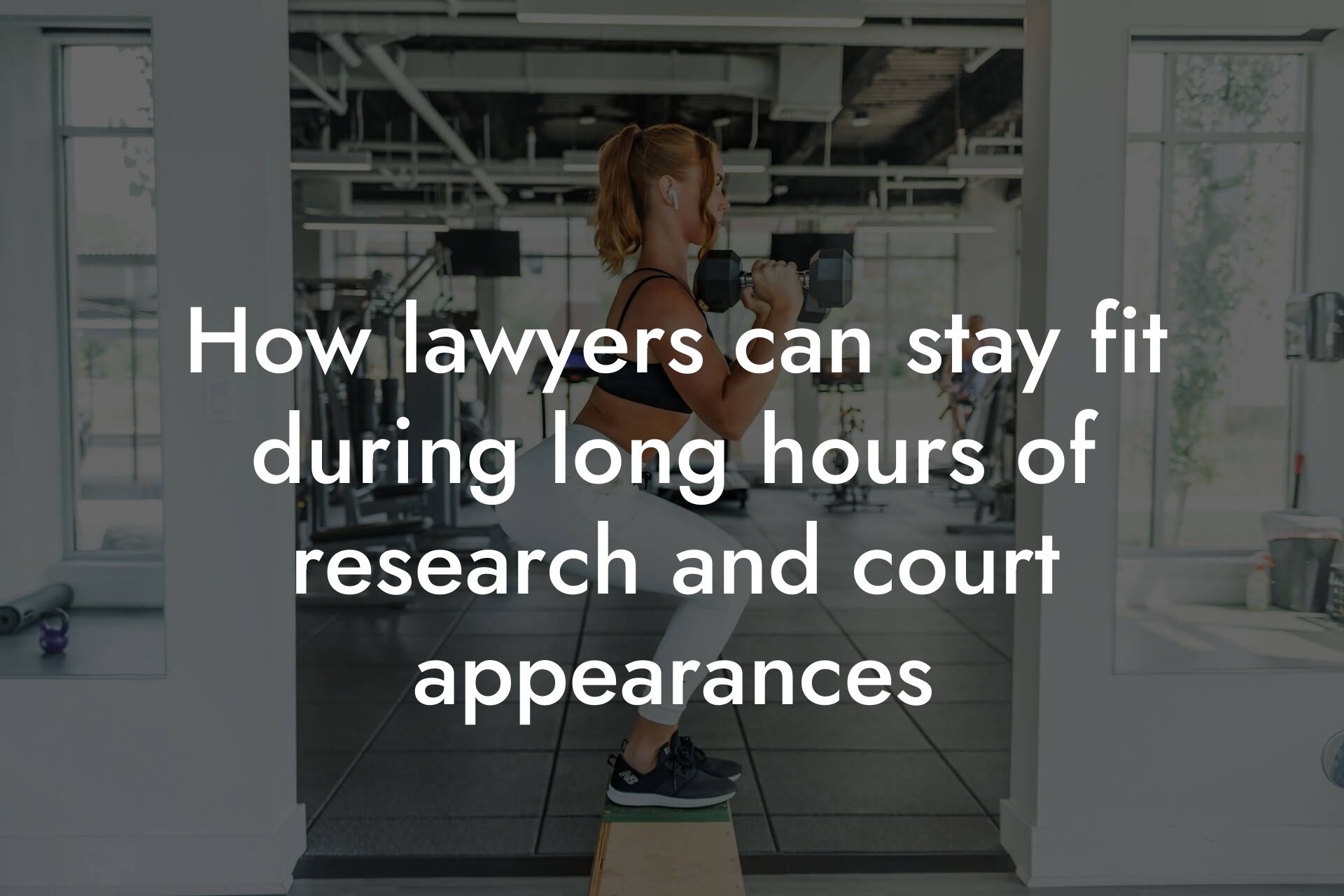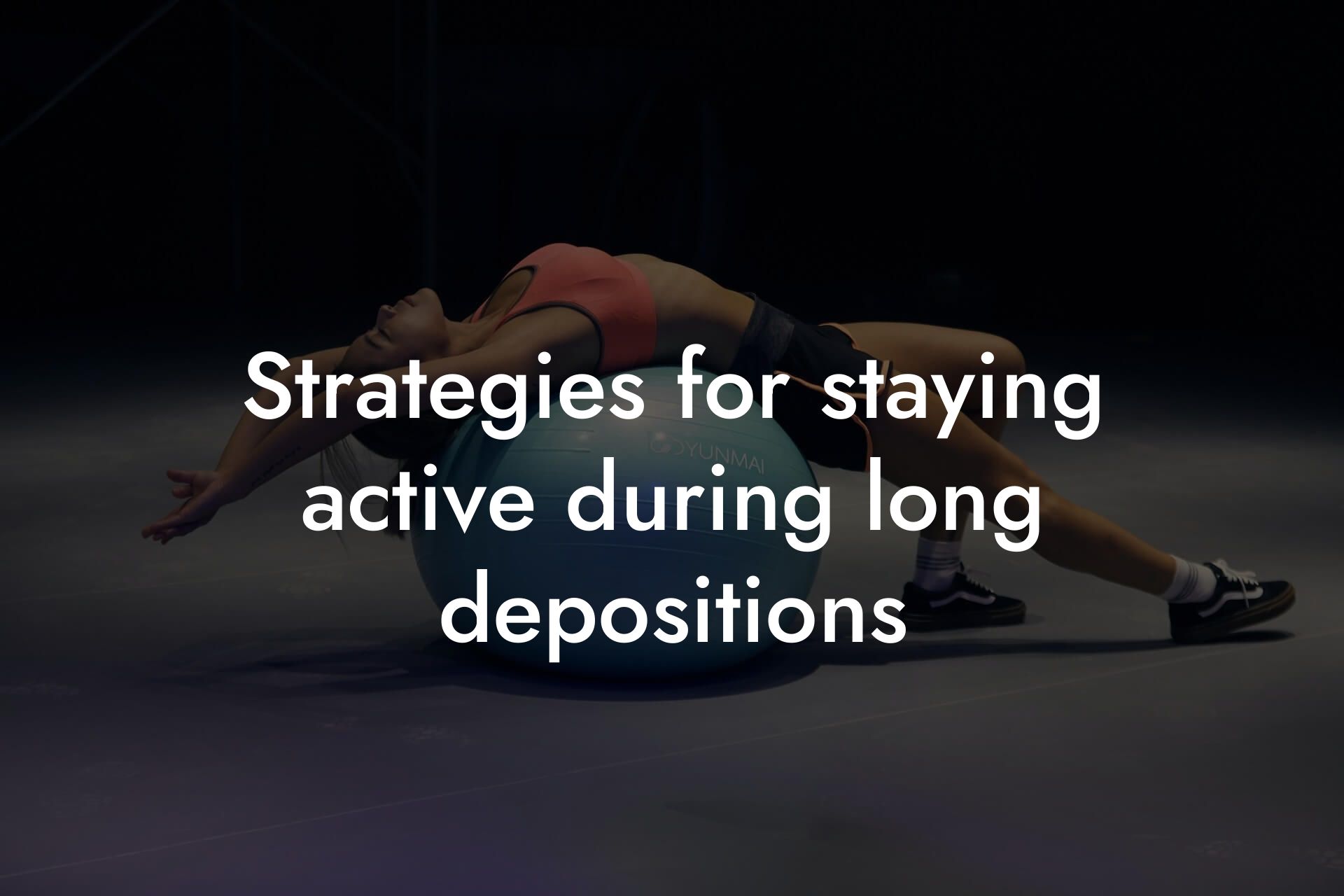As a high-earning professional in the legal field, you understand the demands of your job. Long hours, tight deadlines, and high-stakes cases can take a toll on your mental and physical health. Chronic stress can lead to burnout, decreased productivity, and a compromised immune system. However, incorporating physical fitness into your lifestyle can be a game-changer in managing stress and achieving overall well-being.
Table of Contents
The Impact of Stress on Lawyers
Lawyers are notorious for their high-stress profession. The pressure to meet deadlines, manage caseloads, and navigate complex legal issues can be overwhelming. According to the American Bar Association, lawyers are 3.6 times more likely to suffer from depression and 1.5 times more likely to experience anxiety than the general population. Chronic stress can lead to a range of physical and mental health issues, including:
- Cardiovascular disease
- Insomnia and sleep disorders
- Digestive problems
- Weight gain or loss
- Mood disorders
- Decreased cognitive function
The Benefits of Physical Fitness for Lawyers
Regular physical activity can help mitigate the negative effects of stress on the body and mind. Exercise has been shown to:
- Reduce symptoms of anxiety and depression
- Improve sleep quality
- Boost mood and cognitive function
- Enhance cardiovascular health
- Increase energy levels
- Improve overall physical health
How Exercise Reduces Stress
Exercise has a profound impact on the body's stress response system. When you engage in physical activity, your body releases endorphins, also known as "feel-good" hormones. These natural mood-boosters help reduce stress and anxiety by:
- Distracting from stressful thoughts and emotions
- Reducing muscle tension
- Improving mood and reducing symptoms of depression
- Enhancing self-esteem and confidence
Types of Exercise for Stress Relief
Any form of exercise can help reduce stress, but some activities are more effective than others. Here are some exercises that are particularly well-suited for lawyers:
- Yoga: Combines physical movement with mindfulness and breathing techniques to reduce stress and anxiety
- Walking or jogging: Low-impact cardio exercises that can be done anywhere, anytime
- Swimming: Gentle on the joints and can help reduce muscle tension
- High-intensity interval training (HIIT): Short, intense workouts that can be done in a short amount of time
- Mind-body exercises: Activities like tai chi, Pilates, and qigong that combine physical movement with mindfulness and relaxation techniques
Creating a Fitness Routine for Busy Lawyers
As a busy lawyer, finding time to exercise can be challenging. However, incorporating physical activity into your daily routine can be as simple as:
- Taking a 10-minute walk during your lunch break
- Doing a few jumping jacks or stretching exercises during commercial breaks while watching TV
- Scheduling exercise into your daily planner, just like you would any other appointment
- Finding a workout buddy or accountability partner to keep you motivated
- Investing in a fitness tracker or wearable device to track your progress
Monitoring Progress with DEXA Scans
As a high-earning professional, you understand the importance of tracking progress and making data-driven decisions. At Tano Performance Group, we use DEXA scans to provide a comprehensive body assessment, including:
- Body fat percentage
- Bone density
- Lean muscle mass
- Visceral fat
- Resting metabolic rate
By tracking your progress with regular DEXA scans, you can:
- Monitor changes in body composition
- Adjust your fitness routine to achieve optimal results
- Make informed decisions about your nutrition and lifestyle
- Stay motivated and focused on your fitness goals
As a lawyer, managing stress is crucial to maintaining your physical and mental health. Incorporating physical fitness into your lifestyle can be a powerful tool in reducing stress and achieving overall well-being. By understanding the benefits of exercise, finding activities that work for you, and tracking your progress with DEXA scans, you can take control of your health and achieve peak performance in the legal field.
At Tano Performance Group, we are committed to helping high-earning professionals like you achieve their fitness goals and take their business to the next level. Contact us today to learn more about our DEXA scans and comprehensive body assessments.
Frequently Asked Questions
What is the connection between physical fitness and stress management in the legal field?
Research has consistently shown that regular physical activity can help reduce stress levels, improve mood, and enhance overall well-being. In the legal field, where high-pressure deadlines, long hours, and intense competition are common, physical fitness can be a valuable tool for managing stress and improving performance.
How does physical fitness impact mental health in lawyers?
Physical fitness has been shown to have a positive impact on mental health, reducing symptoms of anxiety and depression, and improving sleep quality. For lawyers, who are at high risk of developing mental health issues, regular physical activity can be a crucial component of a self-care routine.
What are some common physical symptoms of stress in lawyers?
Lawyers may experience a range of physical symptoms related to stress, including headaches, back pain, digestive issues, and fatigue. Regular physical activity can help alleviate these symptoms, improving overall health and well-being.
How can physical fitness improve focus and concentration in lawyers?
Regular physical activity has been shown to improve cognitive function, including focus, concentration, and memory. For lawyers, who require intense mental focus to perform at their best, physical fitness can be a valuable tool for improving performance.
What are some common barriers to physical fitness in the legal field?
Lawyers often cite lack of time, high workload, and sedentary work environment as barriers to regular physical activity. However, with a little creativity and commitment, it is possible to incorporate physical fitness into even the busiest of schedules.
How can lawyers prioritize physical fitness despite a demanding work schedule?
Lawyers can prioritize physical fitness by scheduling workouts into their daily routine, finding activities that can be done in short bursts, such as lunch breaks or during commutes, and incorporating physical activity into daily tasks, such as taking the stairs instead of the elevator.
What are some exercises that can be done at a desk or in a small space?
There are many exercises that can be done at a desk or in a small space, including chair squats, desk push-ups, and leg raises. These exercises can help improve flexibility, strength, and circulation, even in the midst of a busy workday.
How can physical fitness improve sleep quality in lawyers?
Regular physical activity has been shown to improve sleep quality, duration, and depth. For lawyers, who often struggle with sleep disturbances, physical fitness can be a valuable tool for improving overall health and well-being.
What is the impact of physical fitness on cardiovascular health in lawyers?
Regular physical activity has been shown to reduce the risk of cardiovascular disease, improve blood pressure, and enhance overall cardiovascular health. For lawyers, who are at high risk of developing cardiovascular disease, physical fitness can be a crucial component of a healthy lifestyle.
How can physical fitness improve self-esteem and confidence in lawyers?
Regular physical activity has been shown to improve self-esteem and confidence, enhancing overall mental health and well-being. For lawyers, who often struggle with self-doubt and imposter syndrome, physical fitness can be a valuable tool for building confidence and self-assurance.
What are some ways to incorporate physical fitness into daily commutes?
Lawyers can incorporate physical fitness into daily commutes by walking, cycling, or taking public transportation instead of driving, or by doing exercises on the train or bus, such as stretching or yoga.
How can physical fitness improve relationships and social connections in lawyers?
Regular physical activity has been shown to improve social connections and relationships, enhancing overall mental health and well-being. For lawyers, who often struggle with work-life balance, physical fitness can be a valuable tool for building and maintaining relationships.
What are some exercises that can be done during lunch breaks?
There are many exercises that can be done during lunch breaks, including walking, jogging, yoga, or strength training. These exercises can help improve physical health, reduce stress, and enhance overall well-being.
How can physical fitness improve creativity and problem-solving skills in lawyers?
Regular physical activity has been shown to improve cognitive function, including creativity and problem-solving skills. For lawyers, who require innovative thinking and strategic problem-solving, physical fitness can be a valuable tool for improving performance.
What are some ways to stay motivated and accountable with physical fitness goals?
Lawyers can stay motivated and accountable with physical fitness goals by setting specific, achievable goals, finding a workout buddy or accountability partner, and tracking progress through a fitness tracker or journal.
How can physical fitness improve bone density in lawyers?
Regular physical activity, especially weight-bearing exercises, has been shown to improve bone density, reducing the risk of osteoporosis and fractures. For lawyers, who are at high risk of developing osteoporosis, physical fitness can be a crucial component of a healthy lifestyle.
What are some exercises that can be done at home or in a hotel room?
There are many exercises that can be done at home or in a hotel room, including bodyweight exercises, yoga, or resistance band exercises. These exercises can help improve physical health, reduce stress, and enhance overall well-being, even when traveling or working from home.
How can physical fitness improve overall health and well-being in lawyers?
Regular physical activity has been shown to improve overall health and well-being, reducing the risk of chronic diseases, improving mental health, and enhancing overall quality of life. For lawyers, who are at high risk of developing chronic diseases, physical fitness can be a crucial component of a healthy lifestyle.
What are some common myths about physical fitness in the legal field?
Some common myths about physical fitness in the legal field include the idea that lawyers are too busy to exercise, that exercise is only for young people, or that exercise is a luxury, not a necessity. However, the truth is that physical fitness is essential for overall health and well-being, and can be incorporated into even the busiest of schedules.
How can physical fitness improve productivity and efficiency in lawyers?
Regular physical activity has been shown to improve productivity and efficiency, enhancing overall performance and reducing stress. For lawyers, who require high levels of focus and concentration, physical fitness can be a valuable tool for improving performance.
What are some ways to incorporate physical fitness into daily routines?
Lawyers can incorporate physical fitness into daily routines by scheduling workouts into their daily schedule, finding activities that can be done in short bursts, and incorporating physical activity into daily tasks, such as taking the stairs instead of the elevator.
How can physical fitness improve resilience and adaptability in lawyers?
Regular physical activity has been shown to improve resilience and adaptability, enhancing overall mental health and well-being. For lawyers, who often face high-pressure situations and intense competition, physical fitness can be a valuable tool for building resilience and adaptability.
What are some resources available for lawyers who want to prioritize physical fitness?
There are many resources available for lawyers who want to prioritize physical fitness, including fitness apps, workout classes, and personal trainers. Tano Performance Group also offers a range of resources and services to help high-earning professionals achieve their fitness goals.
Here are some related articles you might love...
- How regular DEXA scans can benefit legal professionals
- How lawyers can stay fit during long hours of research and court appearances
- Strategies for staying active during long depositions
- How physical health can improve client interactions
- Nutrition tips for lawyers during trial season
- The impact of body composition on cognitive function in law
- Maintaining fitness during intense case work
- The importance of physical activity in preventing burnout in law
- Quick exercise routines for legal professionals with busy schedules
Zak Faulkner
Zak Faulkner is a leading authority in the realm of physical health and body composition analysis, with over 15 years of experience helping professionals optimise their fitness and well-being. As one the experts behind Tano Performance Group, Zak has dedicated his career to providing in-depth, science-backed insights that empower clients to elevate their physical performance and overall health.
With extensive knowledge of DEXA technology, Zak specializes in delivering comprehensive body assessments that offer precise data on body fat, muscle mass, bone density, and overall physique. His expertise enables individuals to make informed decisions and achieve their fitness goals with accuracy and confidence. Zak’s approach is rooted in a deep understanding of human physiology, combined with a passion for helping clients unlock their full potential through personalised strategies.
Over the years, Zak has earned a reputation for his commitment to excellence, precision, and client-focused service. His guidance is trusted by top professionals who demand the best when it comes to their health. Whether advising on fitness programs, nutritional strategies, or long-term wellness plans, Zak Faulkner’s insights are a valuable resource for anyone serious about taking their health and fitness to the next level.
At Tano Performance Group, Zak continues to lead our Content Team revolutionising how professionals approach their physical health, offering unparalleled expertise that drives real results.




